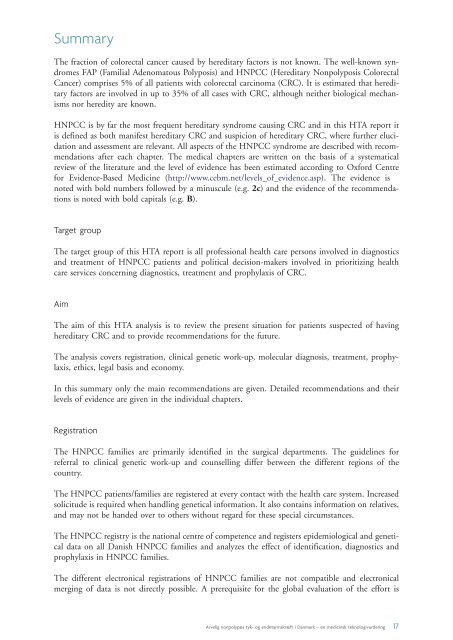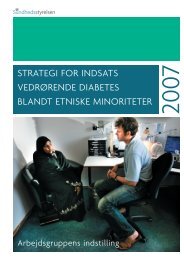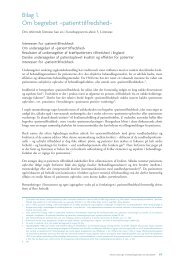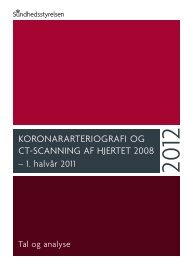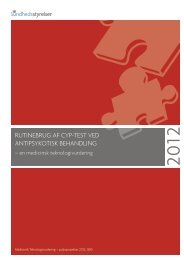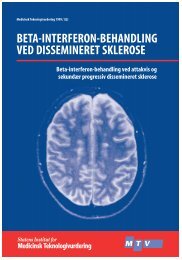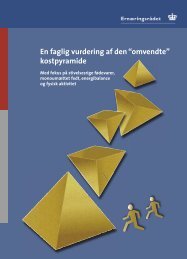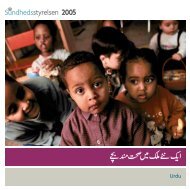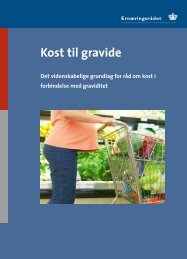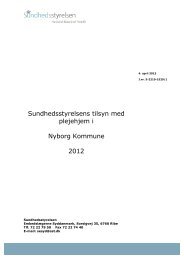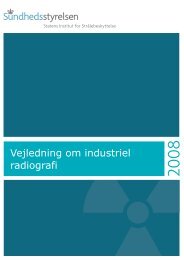(HNPCC) I DANMARK - Sundhedsstyrelsen
(HNPCC) I DANMARK - Sundhedsstyrelsen
(HNPCC) I DANMARK - Sundhedsstyrelsen
You also want an ePaper? Increase the reach of your titles
YUMPU automatically turns print PDFs into web optimized ePapers that Google loves.
Summary<br />
The fraction of colorectal cancer caused by hereditary factors is not known. The well-known syndromes<br />
FAP (Familial Adenomatous Polyposis) and <strong>HNPCC</strong> (Hereditary Nonpolyposis Colorectal<br />
Cancer) comprises 5% of all patients with colorectal carcinoma (CRC). It is estimated that hereditary<br />
factors are involved in up to 35% of all cases with CRC, although neither biological mechanisms<br />
nor heredity are known.<br />
<strong>HNPCC</strong> is by far the most frequent hereditary syndrome causing CRC and in this HTA report it<br />
is defined as both manifest hereditary CRC and suspicion of hereditary CRC, where further elucidation<br />
and assessment are relevant. All aspects of the <strong>HNPCC</strong> syndrome are described with recommendations<br />
after each chapter. The medical chapters are written on the basis of a systematical<br />
review of the literature and the level of evidence has been estimated according to Oxford Centre<br />
for Evidence-Based Medicine (http://www.cebm.net/levels_of_evidence.asp). The evidence is<br />
noted with bold numbers followed by a minuscule (e.g. 2c) and the evidence of the recommendations<br />
is noted with bold capitals (e.g. B).<br />
Target group<br />
The target group of this HTA report is all professional health care persons involved in diagnostics<br />
and treatment of <strong>HNPCC</strong> patients and political decision-makers involved in prioritizing health<br />
care services concerning diagnostics, treatment and prophylaxis of CRC.<br />
Aim<br />
The aim of this HTA analysis is to review the present situation for patients suspected of having<br />
hereditary CRC and to provide recommendations for the future.<br />
The analysis covers registration, clinical genetic work-up, molecular diagnosis, treatment, prophylaxis,<br />
ethics, legal basis and economy.<br />
In this summary only the main recommendations are given. Detailed recommendations and their<br />
levels of evidence are given in the individual chapters.<br />
Registration<br />
The <strong>HNPCC</strong> families are primarily identified in the surgical departments. The guidelines for<br />
referral to clinical genetic work-up and counselling differ between the different regions of the<br />
country.<br />
The <strong>HNPCC</strong> patients/families are registered at every contact with the health care system. Increased<br />
solicitude is required when handling genetical information. It also contains information on relatives,<br />
and may not be handed over to others without regard for these special circumstances.<br />
The <strong>HNPCC</strong> registry is the national centre of competence and registers epidemiological and genetical<br />
data on all Danish <strong>HNPCC</strong> families and analyzes the effect of identification, diagnostics and<br />
prophylaxis in <strong>HNPCC</strong> families.<br />
The different electronical registrations of <strong>HNPCC</strong> families are not compatible and electronical<br />
merging of data is not directly possible. A prerequisite for the global evaluation of the effort is<br />
Arvelig nonpolypøs tyk- og endetarmskræft i Danmark – en medicinsk teknologivurdering 17


